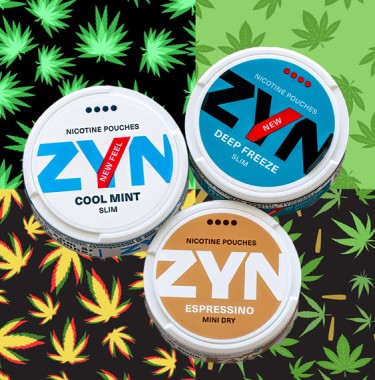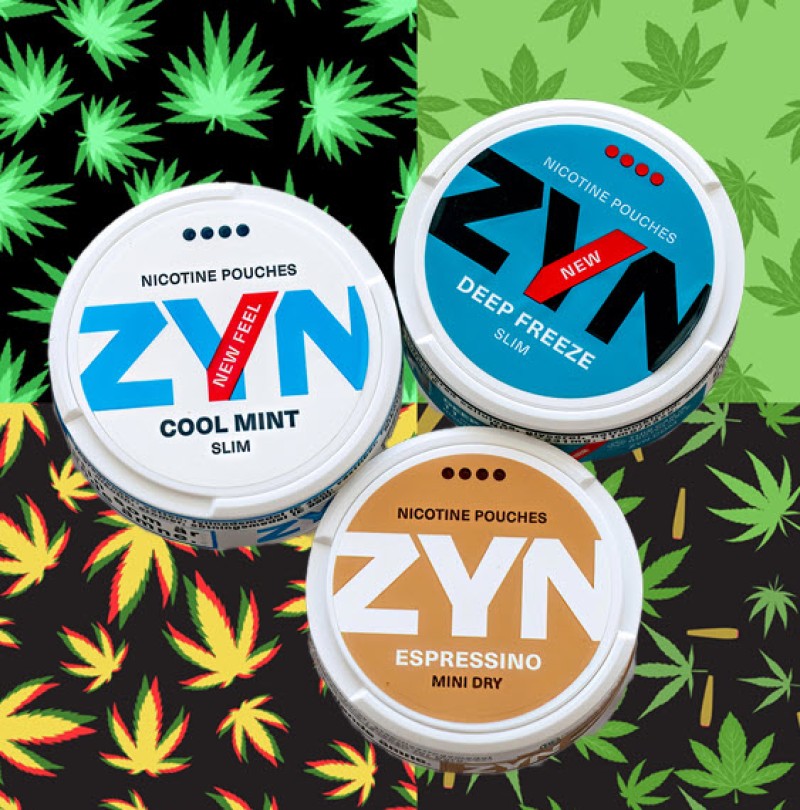
In recent years, the nicotine pouch category has experienced remarkable growth, with Zyn emerging as a market leader and reshaping consumer preferences. These smokeless, spit-free pouches offer a discreet and convenient alternative to traditional tobacco products, appealing to a broad demographic seeking reduced-risk nicotine consumption. As the cannabis industry continues its rapid expansion, a compelling question arises: can cannabis pouches achieve similar success and transform cannabis consumption in the same way?
Jaiver Hasse of Benzinga asked a good question recently, can pouches do for cannabis what Zyn did for nicotine?
The easy answer is "no", because cannabis is an illegal schedule 1 federal drug just like cocaine, and tobacco is not.
But what if there was a future is cannabis lip pouches? What would it look like?
The Rise of Zyn: A Case Study in Market Disruption
Zyn, originally developed by Swedish Match and now owned by Philip Morris International (PMI), has become synonymous with nicotine pouches in the U.S. market. By delivering nicotine through small, odorless pouches placed under the lip, Zyn provides a smoke-free, discreet experience that has resonated strongly with consumers.
The brand’s growth trajectory is impressive. In 2024, Zyn shipped over 644 million cans in the U.S., representing a 50% increase year-over-year and securing more than 70% market share in the nicotine pouch segment. PMI’s substantial investments-exceeding $800 million-underscore their confidence in the category’s long-term potential.
Zyn’s success can be attributed to several key factors:
-
Convenience and Discretion: The product’s smokeless and odorless format allows use in diverse settings without social stigma.
-
Perceived Reduced Risk: While not without risks, nicotine pouches are widely regarded as a less harmful alternative to combustible tobacco.
-
Product Variety: A broad range of flavors and nicotine strengths caters to varied consumer preferences.
-
Robust Corporate Support: PMI’s resources have enabled rapid innovation, marketing reach, and distribution scale.
Cannabis Pouches: An Emerging Opportunity
Cannabis pouches, particularly those containing cannabidiol (CBD), are an emerging product category that mirrors the form factor and convenience of nicotine pouches. CBD, a non-intoxicating cannabinoid, is increasingly sought after for its potential therapeutic benefits, including stress relief, relaxation, and pain management. Cannabis transdermal patches are already a booming business in legal states.
Although still nascent, the global CBD pouch market is growing rapidly. Valued at approximately $134 million in 2022, projections estimate it could approach $1.5 billion by 2032, with compound annual growth rates between 18.9% and 28.7%. This growth is fueled by:
-
Increasing Consumer Interest in Wellness: A growing demographic seeks natural, alternative health products.
-
Demand for Smoke-Free Cannabis Consumption: Consumers prefer discreet, convenient, and non-smoking options.
-
Expanding Legalization: Regulatory progress in North America and beyond is opening new markets.
-
Product Convenience: Pre-dosed, portable pouches align with modern lifestyles.
Challenges and Considerations
Despite the promising outlook, cannabis pouches face notable challenges that differentiate them from nicotine pouches:
-
Regulatory Complexity: Unlike nicotine pouches, which operate under relatively stable tobacco regulations, cannabis products contend with a fragmented and evolving legal landscape that varies by jurisdiction.
-
Consumer Education: Public understanding of CBD and cannabis remains uneven, necessitating ongoing education to build trust and clarify benefits.
-
Market Fragmentation: The cannabis pouch sector currently lacks dominant players with the scale and resources comparable to PMI in the nicotine space.
Can Cannabis Pouches Replicate Zyn’s Success?
To achieve comparable market impact, cannabis pouches must focus on several strategic priorities:
-
Product Innovation: Offering diverse cannabinoid profiles, flavors, and delivery formats to meet evolving consumer preferences.
-
Strategic Investment: Securing capital and partnerships to scale production, distribution, and marketing effectively.
-
Regulatory Navigation: Engaging with policymakers to foster clearer, more consistent regulations that facilitate growth.
-
Consumer Communication: Implementing transparent, science-backed messaging to address health and safety concerns and educate the market.
Market Outlook
The cultural landscape is shifting in favor of cannabis acceptance, both medically and recreationally. This evolving sentiment, combined with increasing demand for wellness-oriented, smoke-free consumption methods, positions cannabis pouches well for growth. If the industry can successfully address regulatory and educational barriers, cannabis pouches have the potential to become a significant segment within the multi-billion-dollar cannabis market.
Conclusion
Zyn’s rise exemplifies how innovation, consumer insight, and strategic investment can disrupt established markets and redefine consumption habits. Cannabis pouches stand at a similar inflection point, with the opportunity to transform cannabis use by providing a discreet, convenient, and socially acceptable alternative.
While challenges remain, the potential for cannabis pouches to replicate Zyn’s success is substantial. As the cannabis industry continues to mature, this emerging category warrants close attention from investors, manufacturers, and consumers alike. The coming years will be critical in determining whether cannabis pouches can indeed capture a significant share of the $30 billion-plus cannabis market and reshape the way consumers engage with cannabis products.






